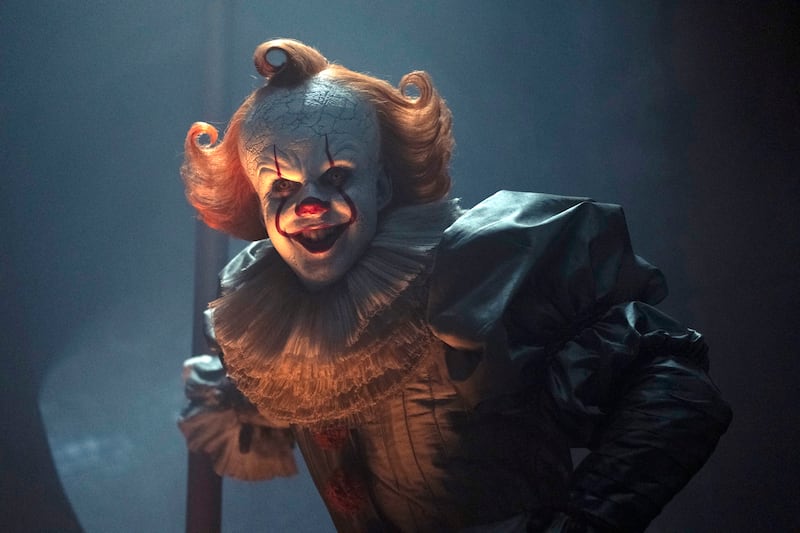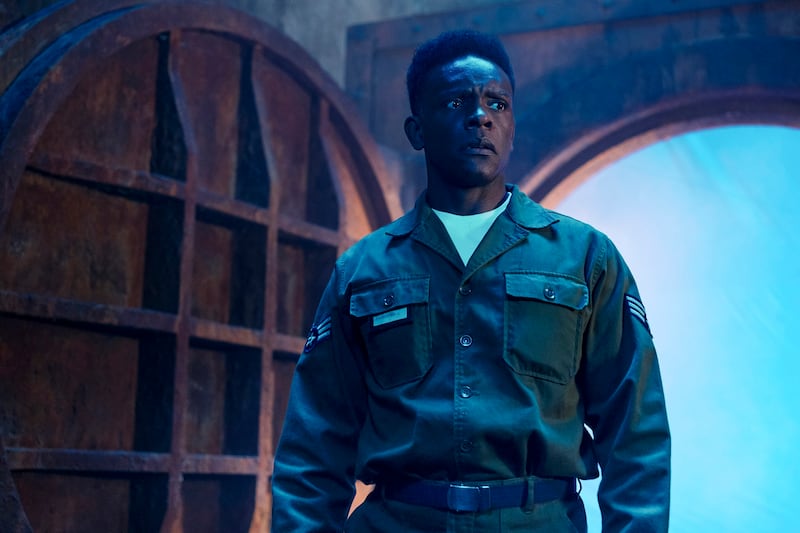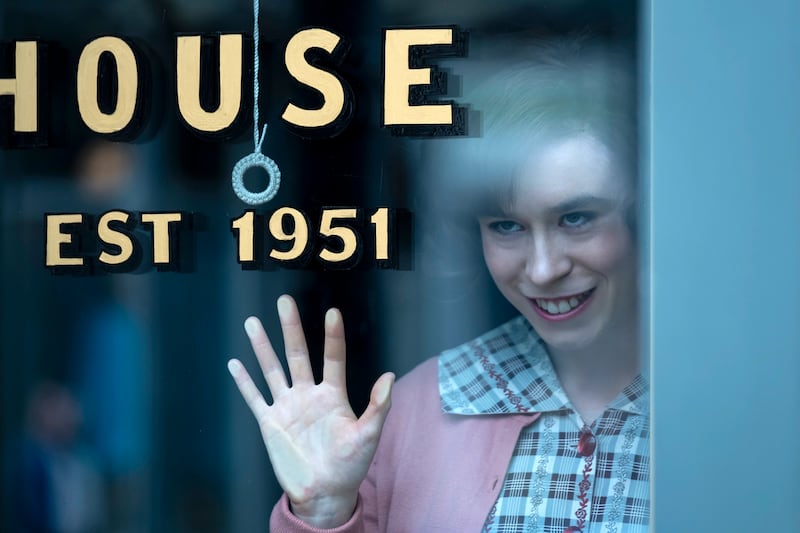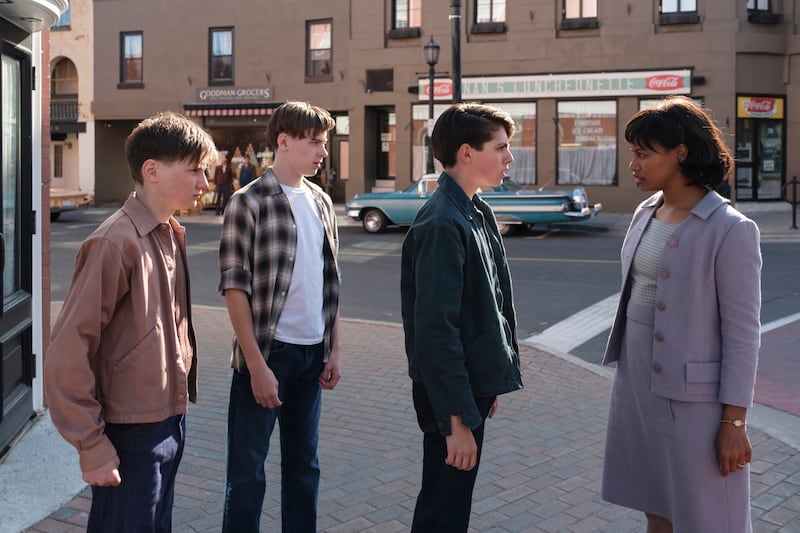A seminal work of modern horror, It is an epic of friendship, suffering, and evil—on a personal, societal, and supernatural scale—that forever turned clowns into figures of unspeakable terror.
Twice adapted for the screen, first as a 1990 TV miniseries led by an unforgettable Tim Curry, and later as a 2017-2019 big-screen two-parter, it’s one of Stephen King’s finest novels, a large-scale portrait of the corrosive ugliness lurking beneath small-town America’s surface which is embodied by a creature who takes the form of a grinning, taunting, balloon-carrying carnival attraction. Thirty-nine years after its initial publication, it remains a masterpiece of the genre—1,138 pages of harrowing and heartbreaking nightmare fuel.
And now, with It: Welcome to Derry, it receives a reputation-sullying prequel.
Created by Andy Muschietti, Barbara Muschietti, and Jason Fuchs—the team behind the It feature films—the eight-episode HBO series, premiering Oct. 26, is a misbegotten expansion of King’s saga that’s undone by shoddy plotting, weak characterizations, and the most groanworthy premise in recent memory.
There’s no other way to put it except to say that It: Welcome to Derry hinges on an idea that’s so dumb, it’s impossible to take seriously.
That it indulges in tepid CGI-ified scare tactics and dispenses numerous corny Easter Eggs doesn’t help. However, these are peripheral problems in light of the show’s foundational asininity, which is exacerbated by a laughable new mythology concerning its baddie. Throw in some strained 2022-ish racial politics and only fleeting glimpses of its central fiend, and you have the worst King adaptation in many moons.
Bill Skarsgård reprises his role as Pennywise the Dancing Clown in It: Welcome to Derry, albeit barely; while the specific timing of his maiden appearance is under strict network embargo, it’s fair to say that audiences shouldn’t hold their breath waiting for his arrival.

Fortunately for the series, Pennywise often transforms into the very things his victims fear most—since the monster feeds on fright—and he does just that with Matty (Miles Ekhardt) when, after sneaking into a movie theater run by Hank (Stephen Rider), the kid runs away from home and smack dab into supernatural Hell.
The boy’s fate troubles his sorta-kinda friends Phil (Jack Molloy Legault) and Teddy (Mikkal Karim Fidler), as well as Lilly (Clara Stack), whose recent stint at Juniper Hill Asylum (due to the trauma of her dad’s pickle factory-related death) has saddled her with the nickname “Looney Lilly.” When she hears Matty talking to her from her bathtub drain, she goes to Phil and Teddy, whose research leads them to Hank’s daughter Ronnie (Amanda Christine), who’s furious that the cops are trying to pin Matty’s misfortune on her dad.
All of this culminates with movie theater mayhem that’s less scary than chaotic, and it shifts It: Welcome to Derry’s focus to Lilly, her best friend Margie (Matilda Lawler), classmate Rich (Arian S. Cartaya), and new-to-Derry pal Will (Blake Cameron James), a science nerd whose father Leroy (Jovan Adepo) is an Air Force pilot assigned to work under General Shaw (James Remar).
Leroy immediately hears rumors about the strange things going on at the Derry base, although at outset, the most menacing thing he faces is a racist white comrade and violent masked attackers. Meanwhile, his wife Charlotte (Taylour Paige), who was involved in the Civil Rights movement back in Louisiana, searches for some way to aid the cause, and finds it with the persecuted Hank, much to the chagrin of her husband, who doesn’t want her rocking the boat.

(Warning: Spoilers ahead.)
The series’ set-up riffs on its source material in ways both big and small, complete with numerous references aimed at the King faithful (including nods to turtles, Shawshank prison, and Calumet Baking Powder) and the participation of The Shining’s Dick Hallorann (Chris Chalk), whose psychic gifts are being used by Shaw to locate a “weapon” buried somewhere in Derry.
Specifically, the U.S. military intends to capture Pennywise and sic him on the Russians and Cubans in order to prevent the forthcoming missile crisis and win the Cold War. To control the monster, which they barely understand, they must acquire the 13 “pillars”—rock shards from the “cage” in which it traveled to Earth millions of years ago—that have the power to contain it à la kryptonite, and whose whereabouts have been protected for centuries by a Native American population that’s acted as humanity’s selfless guardians.
Leroy is the apparent key to this covert scheme, because he’s suffered a brain injury that’s left him unable to feel fear.

From every possible perspective, this is insanely inane, and yet It: Welcome to Derry proceeds as if this plan were merely par for the foolish course for descendants of the Northeast’s original colonial settlers.
That so many people know about Pennywise (and his history) undercuts his malevolent boogeyman stature, as do all the newly created rules and details about his ancestry and nature—which are, to a tee, eye-rollingly lame. Each subsequent development is more lackluster than the last, from the action’s on-the-nose racial and ethnic messaging, to its de rigueur sights of kids riding bikes at night and sneaking around streets and sewers with flashlights, to its chintzy digital ghouls.
There’s a distinct Stranger Things quality to its set pieces and performances, the latter ranging from mediocre to clunky. Yet nothing is as disastrous as the basic notion that the Air Force imagines Pennywise as an attack dog it can keep on a leash—which, to put it lightly, is beyond goofy.

King’s novels are often interconnected but It: Welcome to Derry’s mix-and-match approach negates his tale’s mystery and wonder; for example, the fact that Dick, pre-The Overlook Hotel, is hunting Pennywise for the military is a ridiculous amplification of his role in this universe (no matter his brief mention in King’s It).
Fuchs and the Muschiettis explain and explain until Pennywise feels small and obvious. When he finally does pop out of the shadows, the clown provides the proceedings with a necessary jolt of genuine malevolence. Still, by that juncture, it’s far too little, too late to salvage this ill-conceived affair, whose overarching narrative is predicated on unbelievable silliness, and whose every step is a stumble.
It: Welcome to Derry is what happens when a popular property is rehashed and remixed until every ounce of what made it special in the first place is gone. Skarsgård’s Pennywise notwithstanding, it’s a prequel that belongs, aptly, in the sewers.
The post HBO’s New ‘It: Welcome to Derry’ Series Completely Ruins Stephen King’s Epic appeared first on The Daily Beast.




